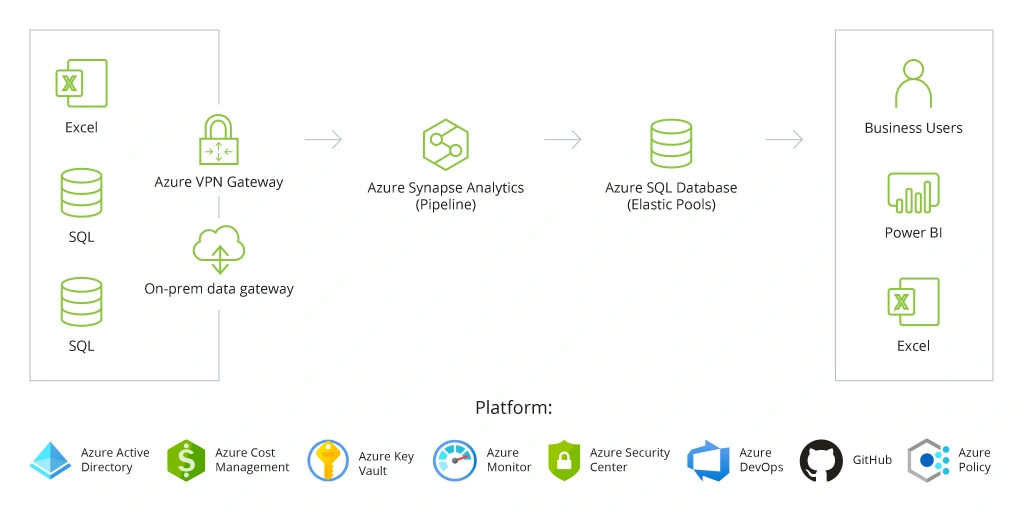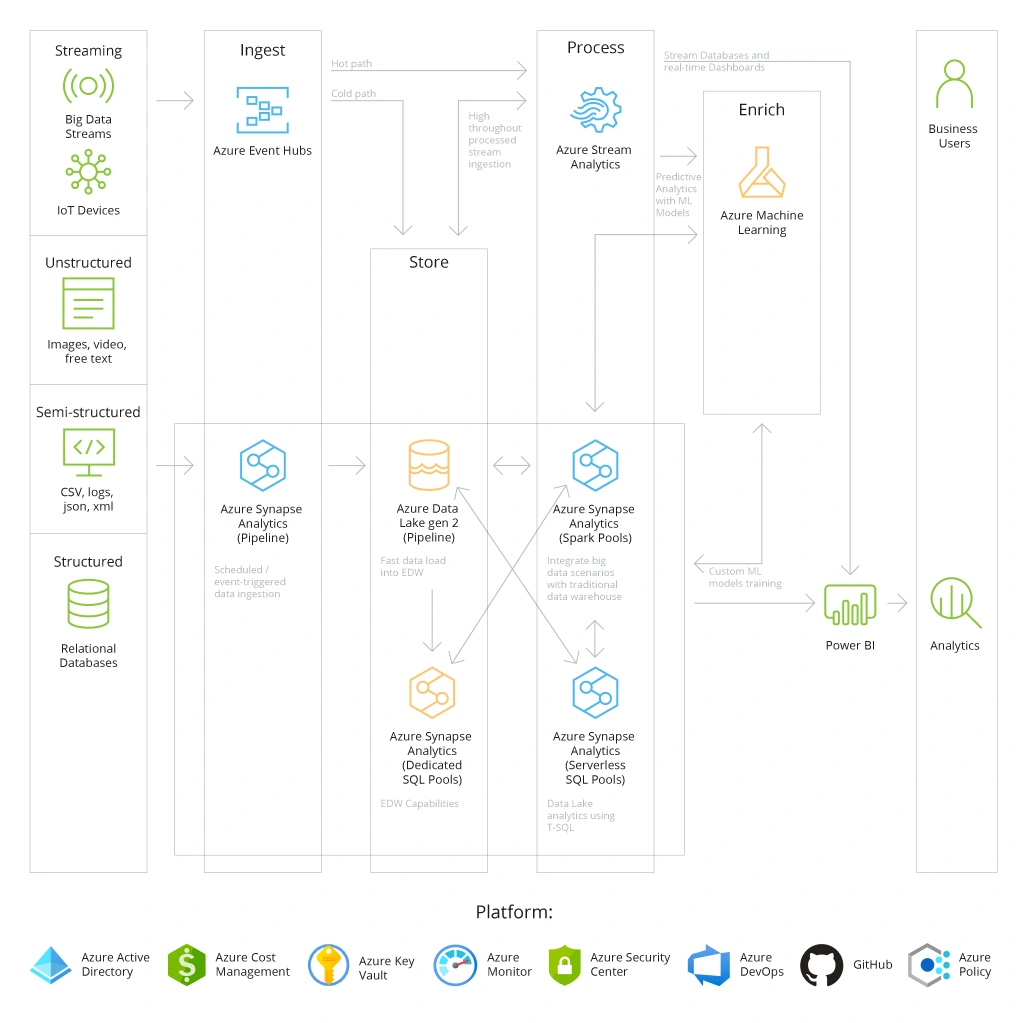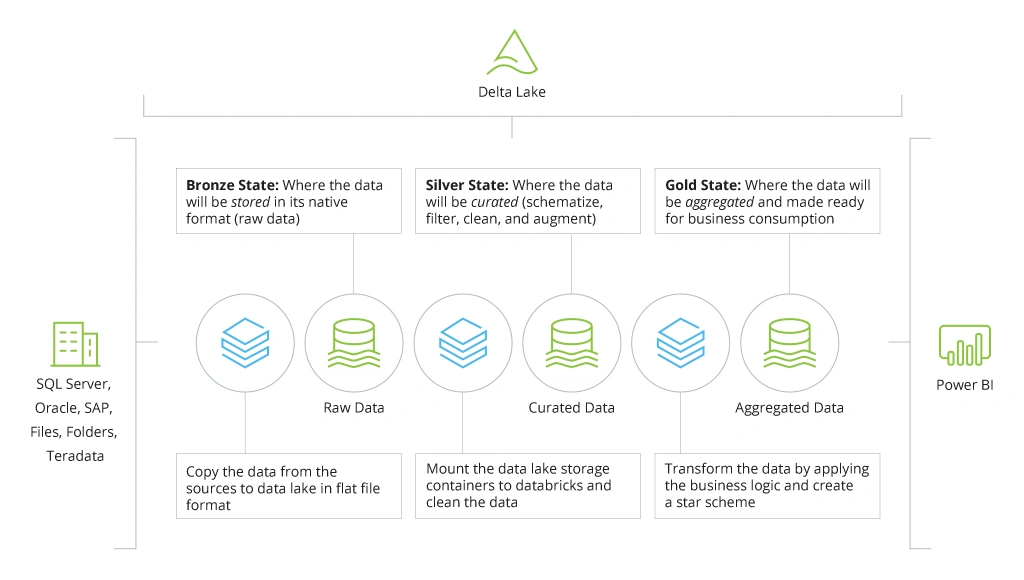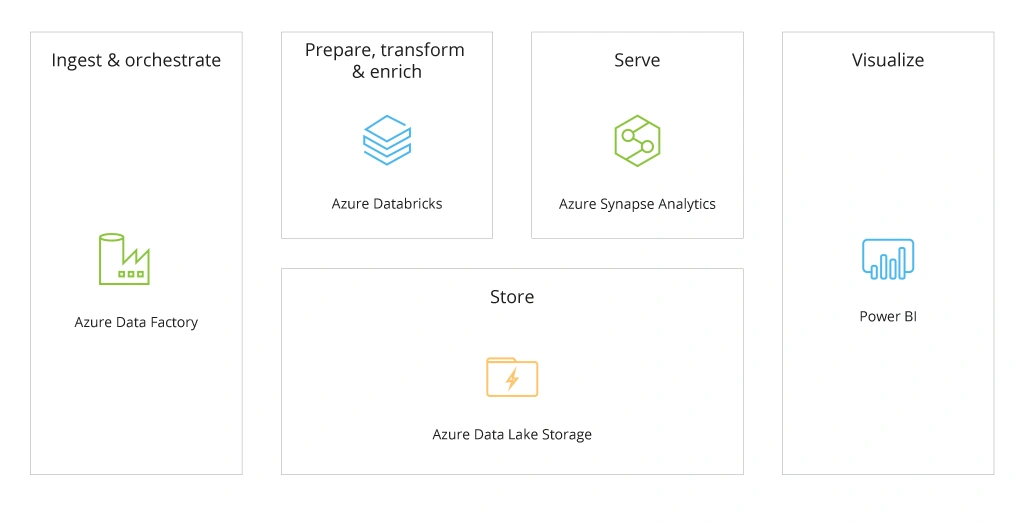Building Modern Data Platforms on Microsoft Azure – Benefits & Use Cases
In this part, we explore the key benefits of the Microsoft Azure toolkit, outline its primary data storage, management, and analytics solutions, as well as demonstrate real-life cases of building future-proof data platforms powered by Azure.
Benefits of Building Data Platforms on Microsoft Azure
Microsoft Azure is a comprehensive cloud platform that provides SaaS, PaaS, and IaaS models, and supports an array of programming languages, software tools, and frameworks. Azure offers a broad spectrum of end-to-end cloud services:
- Data storage and management
- Real-time processing
- Advanced business intelligence
- Next-gen AI/ML capabilities
The Azure toolkit can be used to engineer data platforms of any complexity, from simple DWH to robust platforms that can consolidate and process any type of data, including structured, semi-structured, unstructured, and fast-moving streaming data.
What makes Azure stand out among peer cloud providers is its ultimate flexibility. Organizations can access an immense cluster of products and services and use them as building blocks to tailor the perfect data platform architecture. Users can add, remove, and scale any service or workload on-demand, thus eliminating any extra expenses. Moreover, there is no need to invest in building, managing, and maintaining an underlying infrastructure, as Azure is a fully managed cloud platform with serverless computing capabilities.
Other major benefits of the Azure toolkit for businesses are its inclusion to the holistic Microsoft ecosystem and never-ending technological evolution. Azure-based data platforms can be seamlessly integrated with Microsoft-specific or third-party software to collect data across hybrid environments, orchestrate and monitor data flows, automate ETL processes, and enable big data analytics. Being aware that data is an imperative business asset and that decisions must be made at the speed of human thought, Microsoft perpetually adds new useful features to Azure. Despite continuous innovation and change, Microsoft remains a well-accustomed ecosystem for most of the users, which lowers the threshold for obtaining relevant skills and reduces TCO expenses for businesses.
However, creating a custom data platform with such a vast portfolio of Microsoft products and services can become a significant challenge. As an Azure Expert MSP and a Microsoft Gold Partner with numerous Azure Advanced specializations, Infopulse offers the most complete suite of Azure cloud services and solutions, including the development of modern data platforms that are based on cutting-edge Microsoft tools listed below.
In-depth Overview of the Azure Toolkit
Azure Synapse Analytics is a unified enterprise analytics service that consolidates, processes, and manages data from different DWHs and big data systems, and rapidly serves it for business intelligence needs. It offers the capability to query both relational and non-relational data by using the preferred programming language. Azure Synapse can be seamlessly integrated with Apache Spark (one of the most popular big data engines) to simplify the processes of data preparation, engineering, and ETL. Moreover, the service can be empowered with connected Apache ML and Azure ML to create machine learning models for data warehousing and predictive analytics.
In addition, you can combine Azure Synapse with Azure Databricks, a big data analytics service, to set up an Apache Spark environment in minutes, easily build and configure data clusters, create custom ML models, and access a shared workspace that supports Python, Scala, R, and SQL.
Azure Data Storage & Analytics Tools
Azure Data Factory is a fully managed serverless data integration service that allows ingesting, orchestrating, and transforming raw data from multiple sources at scale. It offers 90 built-in connectors to gather data from SaaS apps (ServiceNow, Salesforce), enterprise databases (Oracle Exadata, Teradata), big data services (Amazon S3, Google BigQuery), and all Azure services. By utilizing Azure Data Factory, you can easily build complex ETL and ELT pipelines and deliver the data to Azure Synapse to unlock valuable business insights or store it in data lakes.
Azure Stream Analytics is one of the essential and real-time analytics tools that can help you deal with fast-streaming data coming from numerous sources simultaneously. The productivity of the data platform will greatly depend on this engine’s capabilities if the data comes in huge volumes from multiple IoT devices, web logs, clickstreams, GIS, etc.
Azure Data Lake Storage – a highly scalable and flexible repository that allows storing and analyzing petabyte-scale data of any type from all possible heterogeneous sources. Azure Data Lake Storage provides the needed foundation for big data analytics, allowing you to unlock the value of all your data assets.
Case in point: upon implementing Azure Data Lake and Data Bricks with the help of Infopulse, a global audit company optimized data extraction and processing while also accelerating the development and deployment of predictive models.
Power BI is an Azure-based business intelligence platform that combines a range of advanced data analytics, management, and reporting tools. The platform assembles raw data across any source, from Excel spreadsheets to complex hybrid DWHs, and transforms it into insightful reports with the help of extensive visualization and customization options. Power BI can serve as a one-stop-shop for the data needs of businesses across multiple industries, as it features built-in AI capabilities, custom connectors, self-service analytics, convenient drag-and-drop functionality, real-time stream analytics, and much more.
Azure-based Data Platforms in Action: Use Cases from Infopulse
Transforming an Azure-based DWH into a Modern Data Platform for a Large Agro Holding
Our long-term client, a large international agro-industrial group, initiated multiple large-scale digital transformation projects to modernize their business processes and improve decision-making. The first project involved the replacement of a legacy data management system with an advanced DWH solution to overcome the following challenges:
- Centralize scattered legacy reporting solutions within a single platform
- Enable faster and more efficient reporting, as well as intelligent analytics
- Support the company development with a scalable solution.
Infopulse engineered and rolled out a flexible DWH solution based on Microsoft Azure. More precisely, the DWH included Azure Synapse Analytics that performed ETL operations, Azure SQL elastic pools for data management, and Power BI to visualize data and generate custom reports. As a result, the new DWH helped the client optimize the performance of internal systems, bridge the existing data silos, and drive actionable insights.
Azure-based DWH Architecture for the Agro Holding

An in-depth overview of the Azure-based DWH, including the full list of its capabilities and business value, is available in this case study.
Consequently, the data needs of the agro-industrial holding started to grow exponentially. Thus, the client’s next strategic objective was to enable real-time analytics of fast-moving streaming data coming from a large ecosystem of IoT devices.
To help our client achieve the desired outcomes, Infopulse developed a brand-new solution architecture and seamlessly transformed the existing DWH into a modern Azure data platform without affecting the company’s business continuity. Now our client operates a cutting-edge data platform that can rapidly ingest and process immense volumes of structured and unstructured data as well as IoT data.
The Architecture of the Brand-new Data Platform

All of the client’s data is transferred into almost limitless storage powered by Azure Data Lake. In addition, the data lake can serve as the foundation for building and deploying predictive ML models.
Delta Lake-powered Data Platform for a Large Packaging & Containers Manufacturer
Our client is one of the leading companies in the containerboard manufacturing, packaging solutions, and paper recycling industry in Europe. The client’s business entities are spread across 10 countries in the EU. Each entity has its specific local regulations and supply-chain flows as well as dispersed data collection, management, and reporting systems. The client’s key objective was to effectively centralize all data operations in a cost-efficient manner.
Having 10+ years of experience in data lake and big data services, Infopulse engineered an advanced enterprise data platform powered by Delta Lake technology. Delta Lake is a data storage and management layer that functions on top of a data lake. The custom Azure data platform features Azure Data Lake Storage Gen2 that gathers all types of data from multiple environments, while Azure Data Bricks serves to consolidate, transform, and compute the mass of the data. As a result, it allows for real-time analytics of the collected data, provided by Power BI.
Azure Databricks Delta Lake Architecture

As a result, our client received the following benefits from implementing the modern enterprise-grade data platform:
- Introduced a reliable single source of truth that consolidates data across the client’s entire business ecosystem
- Streamlined data management and precise analytics throughout all stages of the product lifecycle, including production, procurement, and distribution
- Automated calculations of the key supply chain metrics
- Enabled extensive data visualization and reporting capabilities for all company levels – from production analytics for each business entity to in-depth strategic dashboards for the executive board.
Conclusion
Microsoft Azure is an excellent choice for building modern data platforms, as it is a holistic ecosystem of cutting-edge tools that can cover your data needs from A to Z. Most importantly, due to the inherent flexibility of Azure, you can gradually build, integrate, and expand your data platform to meet the required business goals, all while paying only for what you use.
As an experienced provider of data management services, Infopulse is ready to help you enhance decision-making and leverage maximum value from your data.
![Data Platforms on Azure [banner]](https://www.infopulse.com/uploads/media/banner-1920x528-building-data-platforms-microsoft-azure.webp)


![Generative AI and Power BI [thumbnail]](/uploads/media/thumbnail-280x222-generative-AI-and-Power-BI-a-powerful.webp)
![Data Governance in Healthcare [thumbnail]](/uploads/media/blog-post-data-governance-in-healthcare_280x222.webp)
![AI for Risk Assessment in Insurance [thumbnail]](/uploads/media/aI-enabled-risk-assessment_280x222.webp)
![IoT Energy Management Solutions [thumbnail]](/uploads/media/thumbnail-280x222-iot-energy-management-benefits-use-сases-and-сhallenges.webp)

![Carbon Management Challenges and Solutions [thumbnail]](/uploads/media/thumbnail-280x222-carbon-management-3-challenges-and-solutions-to-prepare-for-a-sustainable-future.webp)

![Automated Machine Data Collection for Manufacturing [Thumbnail]](/uploads/media/thumbnail-280x222-how-to-set-up-automated-machine-data-collection-for-manufacturing.webp)

